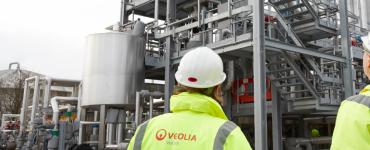- Home
- Latest News
- Mike Froom of Veolia Water Technologies does some crystal ball gazing about the effects of Brexit on the industry

Mike Froom of Veolia Water Technologies does some crystal ball gazing about the effects of Brexit on the industry
The start of AMP6 has already seen its fair share of change and uncertainty and whilst the industry was coming to terms with another slow start, a TOTEX based approach and outcome lead regulation - we still had time to begin considering the impact that the opening up of the retail market may have on the sector in 2017 and what a Water 2020 market might look like. Then, to many people’s surprise, on 23rd June, the UK voted to leave the EU, which poses the question; what impact will this decision have on our already changing market sector?
Voting to leave the EU has certainly contributed to uncertainty in the financial markets as well as the water sector as a whole and until Article 50 of the Lisbon Treaty is activated and starts the maximum two year withdrawal process, this uncertainty is expected to remain.
The immediate visible impact of the decision to leave the EU was the fall of the British Pound to a 30 year low. The deterioration in exchange rate means that goods being imported from Europe (and elsewhere) will be more expensive. It also means that the price of goods manufactured in the UK from imported raw materials is likely to rise, for example, we have already seen a significant increase in stainless steel prices. This will inevitably add to the pressure already being experienced by some Water Companies around their affordability issues.
So what about the wider implications? EU legislation is an obvious consideration and has been driving standards and investments in the water sector for the last 25 years. AMP6 is unlikely to be significantly affected, investment plans have been implemented and current EU legislation is already enshrined in UK policy. Even if Article 50 is invoked in the next few months, negotiations to exit are unlikely to be concluded until the end of 2018.
Another question to consider is; what would replace the Water Framework and Drinking Water Directives and would they be significantly different? In the longer term it would still be a major task to change EU policy that has, in the main, already been incorporated into UK legislation and it is doubtful that there will be much appetite to make fundamental changes, particularly as we continue to strive for free trade within Europe. This only leaves the potential for specific divergence where there are real tangible benefits, but in a future of TOTEX and outcome based decisions surely we can challenge certain areas, such as; environmental quality standards or categorisation of treated biosolids for final disposal or perhaps even drinking water quality standards.
Jersey Water has recently set an interesting example; it had a problem with low rainfall, which increased the concentration of the fungicide Oxadixyl above the 0.1µg/l allowed in the EU Directive. Since Jersey is not a member of the EU it chose to set its own limit of 0.3µg/l – still well below the WHO health-based limit of 3µg/l – saving the expenditure that would have been required to comply with the EU Directive.
Assuming that exit negotiations will not be concluded until late 2018, this will have ongoing implications for the business planning process for AMP7. OFWAT requires companies to submit business plans by 3rd September 2018, those companies with enhanced status being notified in Q2 of 2019 and final determinations before the end of 2019. This parallel timeframe means that whilst water companies are considered as relatively low risk assets, in terms of the cost of equity and cost of debt, uncertainty around investment requirements is likely to be a more contentious issue than in previous price reviews. It is also worth remembering that the European Investment Bank is a significant provider of finance for the UK water sector and therefore uncertain if this source of investment will continue and if it does not, what kind of pressure will this place on finance availability for the sector in the future.
On a positive note, according to UKTI, Britain’s economy is still the fifth largest economy in the world and still regarded as one of the strongest, with low, stable inflation, reduced budget deficit forecast to below 3% this year, high employment rate and a resilient financial system. The message is that the UK remains a great place to do business.
Veolia, at least, is committed to continued growth in the UK. Our CEO, Antoine Frerot, has gone on record as saying that Veolia will continue to invest both in terms of financial and human resources to ensure we remain competitive and innovative, stating “The United Kingdom is a country where we have plans to grow and it will continue to be a major area for Veolia,".













